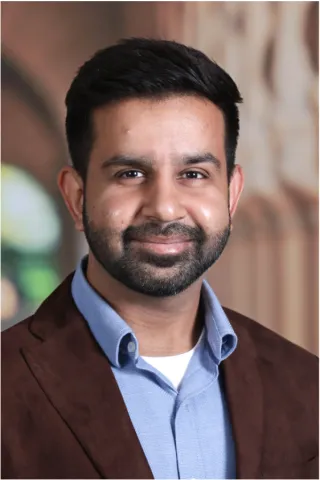
Mansoor Aslam Rathore

Prior to Stanford, I was fortunate to work in the education space as a researcher and consultant, which give me a wide range of experiences in this field. Right after my undergraduate, I initiated a baseline survey across rural schools in Pakistan for a randomized control trial that attempted to test the efficacy of two education financing products. My consulting work gave me exposure to more system-wide educational change: I got the opportunity to work on the development of new textbooks and teacher guides for almost 50,000 public schools in Pakistan’s Punjab province, and support the Ministry of Education on launching a remedial Math program for secondary school students in Saint Lucia. I knew that driving impact in education was my life's true calling.
What really drove me then to apply to Stanford’s ICE/IEPA program was to get a much stronger grasp of the theoretical perspectives, discourses, and best practices in the field of education globally. I had extensive practical experience in this space, but to me, that wasn’t enough. I wanted to understand and get familiar with the most cutting-edge research on educational transformations and innovation and leverage that knowledge to solve Pakistan's unique education challenges. Given's Pakistan burgeoning population of 207 million, I considered education critical to the country's long-term and sustainable growth.
The ICE/IEPA program was the perfect fit for achieving this objective, amongst others. The coursework at Stanford gave me a strong theoretical foundation for the key debates and discourses in education and different ways of thinking about education systems across the globe. In addition, the courses offered me an opportunity to go deep into specific thematic areas that I was very interested in, e.g., education technology or child developmental psychology. Perhaps just as valuable as the courses were the guest speaker sessions that I got the opportunity to attend as part of the program. These sessions focused on topics ranging from philanthropic work, education technology, classroom teaching, and inclusive education to education financing. Such experiences were precisely what I was looking for in terms of exposure to the most relevant ideas and conversations being led by education leaders at the global level. As a Knight-Hennessy (KH) Scholar, I found these conversations to perfectly complement the leadership development opportunities I was receiving as part of the KH community – and this made my time as part of the ICE/IEPA cohort truly memorable.
The program also gave me tangible skills that I was seeking to develop when I came to Stanford. The highlight of the program is most certainly the MA Paper that all students write, and for me, the entire process was brilliantly designed to help me grow as a researcher and writer. This process was fundamentally iterative. We worked on multiple drafts of the paper, received super helpful feedback from our advisor, program director, and TAs, and continuously refined our paper over one year. Also, through the MA Paper and other courses I took, I deepened my quantitative methods skills, which has allowed me to become both a better user and a more informed consumer of quantitative research. These are critical skills today for anyone interested in pursuing a career in education policy and program evaluation.
After a remarkable year in the program, I am now starting my MBA at the Stanford Graduate School of Business. I strongly feel that the research skills, command over quantitative methods, and knowledge of critical education discourses that I have gained through the ICE/IEPA program will be extremely helpful to me in business school and beyond, as I pursue my goal of driving educational change in Pakistan, change that would require collaboration between the public and private sectors.
